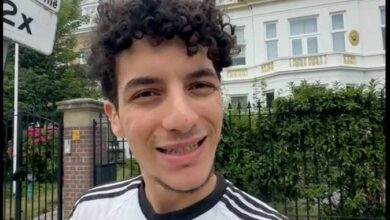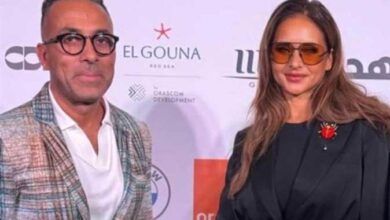I was on the jury of the fourth Brussels Arab Film Festival, which concluded last week. This is my behind-the-scenes diary.
Wednesday. The Festival gets off to a rousing opening in front of a huge crowd of dignitaries, invited artists, film lovers, family and friends. When they invite the feature film jury to take their bow before the audience, the charming MC turns her prompt card over too quickly and forgets to call me. This is partly my own fault, as I am not sitting with the rest of the jury, none of whom I know. Still, I wonder if it isn’t a sign? Perhaps the entire week will go by without anyone noticing I am not there — or rather, that I am there, but no one knows who I am? I savour the feeling of pathological anonymity.
It as just as well I do, as it doesn’t last long. Shortly into the first film of the week — Rashid Mashrawi’s wonderful fable, Layla’s Birthday (not in competition) — the wonderful director of the festival Rachida Chibani somehow manages to locate me in the pitch darkness. She comes over and gives me a huge hug and a heartfelt apology. Suddenly, I remember why I like this festival so much, and what a treat — as much as an honour — it is to be asked to help choose this year’s prize winners.
Thursday. We the jury meet for lunch in a stylish Lebanese bar just round the corner from the cinema. Any residual anxieties I may have had disappear as I shake hands with Morocccan director Hassan Benjelloun, who will preside over our deliberations. He exudes intelligence, experience and calm. I also take instantly to my fellow jurors — Beatrice Louis of Belgian public TV, Swiss-Arab filmmaker Aida Schlaepfer (who will unfortunately have to leave us early), and Guido Huysmans, veteran pro-Palestinian activist and director of the Leuven Africa Film Festival.
Those who are used to sitting on such juries discuss the shortcomings of the systems they have witnessed elsewhere (Cannes, it is generally agreed, is the worst). Hassan proposes an approach whose common sense immediately wins us all over. We will be seeing two films a day most days, sometimes three. Each day, between screenings, we will meet to discuss the films of the previous day, and apply the ‘minimum rule’: any film which has pleased at least one of us will remain in the running. By the end of the week, our ongoing discussions should already have winnowed the field to the point where the final vote can be handled relatively quickly and calmly. I gather that, in this context, ‘relatively quick’ is anything under two hours.
Saturday. The films of the first two days have failed to galvanise the audience into action. Of the directors, only Egypt’s Amr Salama was present to discuss his stylishly implausible melodrama (but isn’t melodrama always implausible?), Zay elnaharda (Today), however, is a different story. First up is Battle, the directorial debut of Belgian-Moroccan actor Mohamed Ouachen. The film tells the story of a group of young people who struggle to reconcile their passion for break-dancing with their family’s aspirations to see them settled in regular employment and happily married. After the screening to a packed house (including a large part of the cast and crew), Ouachen tells how when he approached certain public bodies in Belgium for funding, they told him the script was too ‘soft’ to interest an audience. However, they said they would be prepared to look at it again if he would make the father more violent, and if at least one of the women was veiled, as ‘that was what people want to see’. Arab societies clearly have no monopoly on pre-emptive censorship. And it’s a tribute to Ouachen’s passion and determination — and to his producer, Gérald Frydman — that the film finally saw the light of day in the form in which he intended it.
As for Mohamed Zineddaine’s Do you remember Adil?, to say it divides the audience would be understating the case. This elliptical tale of two brothers from Casablanca and the complex chain of events which lead both of them to Italy and, ultimately, their death, provokes a barrage of objections from those who had difficulty following the plot, and a passionate rejoinder from those who had enjoyed the first film in the festival which really gave its viewers something to do. Repeatedly charged with trying to treat too many themes through a single story, Zineddaine eventually drops his appeals to Proust and Beckett and asks the audience, simply, ‘But isn’t that what life is like? We’re constantly dealing with different issues all day long!’ I am convinced, but I suspect I am in a minority.
Sunday. The day gets off to an extraordinary start with the most magnificent and moving 30 minutes of cinema I have seen in a long time. The opening sequence of Elia Suleiman’s The Time that remains, set during the Nakba, is a hard act to follow, even for Suleiman himself, and the rest of the film deliberately narrates a descent into bathos as it brings its tale of family life in the Israeli-Palestinian town of Nazareth up to the present day. Several of the filmmakers present tell me later that Suleiman is for them the greatest living Arab filmmaker, period. The jury will later concur with them, by placing him above competition — acknowledging his genius, while choosing to give our award to a film which operates on a more ‘human’ level.
The second revelation of the day is Ahmed Rashwan’s Basra. While lacking the formal mastery of Suleiman, this portrait of Cairo during the 2003 invasion of Iraq, as seen through the eyes of a group of young middle-class bohemians, carries an overwhelming sense of authenticity. Like Zineddaine, here is an Arab filmmaker talking about people he knows intimately, yet refusing to judge them in our place. Rashwan’s difficulty in funding his film, and in finding distribution, despite the raft of awards it has won in international festivals, and a strong central performance from Bassem Samra, speaks volumes about the problems facing any Arab filmmaker who tries to offer society an accurate mirror of itself, rather than a distracting, artificial image.
In between the two projections, the organisers invite the audience to celebrate Amr Salama’s birthday with several choruses of ‘Happy Birthday’ — one in each of the relevant languages. It’s that kind of festival.
Monday. The last day of the competition screenings is enlivened by Zakia Tahiri’s hilarious comedy Number One, a satirical take on the condition of Moroccan women following the introduction of the new Family Code in 2003. A factory manager who neglects his wife finds himself in more trouble than he bargained for when she gets a sorceress to turn him into a kind, considerate, sensitive version of his previously macho self. The film has a capacity audience in stitches of laughter. It’s not Ingmar Bergman, but it isn’t trying to be, and it brings the cinema alive in a way no other film in the competition has.
After the last screening of the evening, we the jury retire to our favourite Lebanese bar. Faced with such a diverse set of films, and working with three people whom I have come to like and respect, but about whom I knew nothing at all only a few days before, I fear that we may be in for a long night of arguments, the wisdom of our president not withstanding. But before the waiter can bring the first plate of mezze, we have chosen our prize winners, and the decisions are both enthusiastic, and unanimous.
Tuesday. The award ceremony goes smoothly. Even the MCs remember to call me up to the front to take part in the prizegiving! We start with another chorus of happy birthday for the young Algerian film maker Sabrina Draoui, whose film Tell me, Goulili, was in the short fiction competition.
By a common accord, the jury awards its main prize to Ahmed Rashwan for Basra. Rashwan grins as he receives the plaque, which he promptly dedicates to the people of both Egypt and Algeria. When Sabrina Draoui comes back to the stage for the closing group photo, Rashwan gets her to help him hold his award up. For a moment we all smile, as we share in the illusion that perhaps the cinema can help put back together again what sport — and politics — have torn apart.
Main prize: Basra by Ahmed Rashwan
Special mention: Number One by Zakia Tahiri
Best actor: Omar Lotfi and Amine Ennaji (joint), for Do you remember Adil? by Mohammed Zineddaine
Best actress: Lizzie Brocheré and Olympe Borval (joint), for The Song of the Brides by Karin Albou



